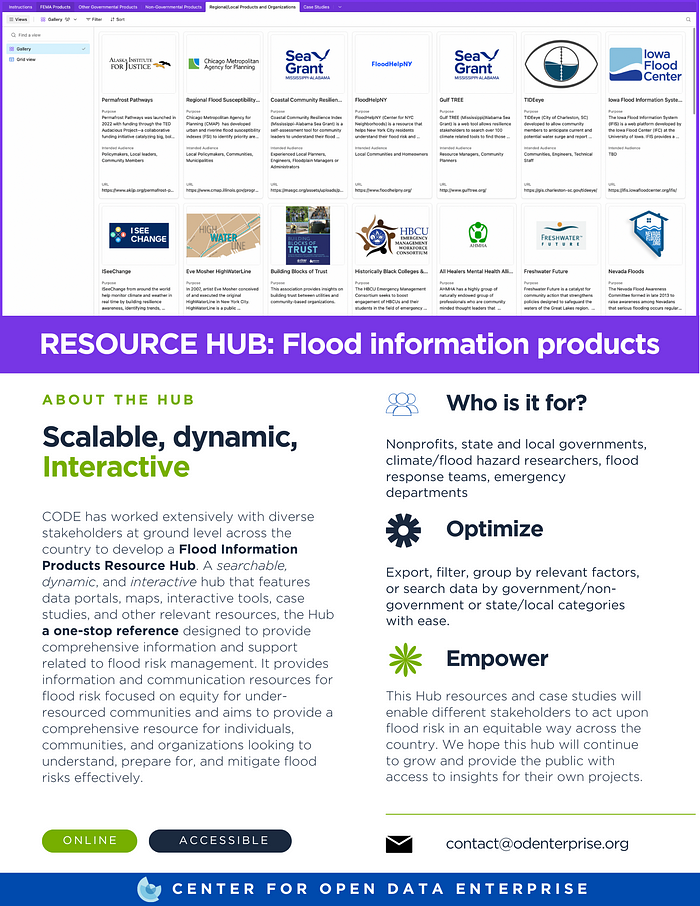CODE’s Flood Resource Hub: A guide for flood information products
Search flood management products by geography, type, or category and read case studies from across states in the US.
Flooding is the most common and costly natural hazard in the United States, with approximately 122 million Americans at risk in the spring of 2024 alone. This risk not only threatens human lives and wellbeing but also results in significant economic and tax losses. A changing climate exacerbates the problem, leading to increased flooding that damages homes, businesses, infrastructure, and interrupts public health, economic prosperity, and national security.
Given the country’s diverse landscape — ranging from coastal regions to river valleys and urban centers — flood threats vary widely. Addressing these challenges demands integrated strategies such as improved forecasting, resilient infrastructure, and robust community preparedness. As flood risk management evolves toward a more comprehensive and proactive approach, there is a growing need for detailed, localized data to help communities become resilient without adding new regulatory burdens. Stakeholders, including nonprofits, state and local governments, researchers, and emergency response teams, require this data to effectively manage and respond to flood risks across the country.
To help fill this gap, the Center for Open Data Enterprise (CODE) has developed a Flood Information Products Resource Hub. CODE has worked extensively with community groups and other stakeholders across the country to understand the landscape of flood data products and develop this resource. CODE has spent several months conducting research, holding conversations and workshops, and compiling case studies, to understand the current state of flood data and develop this Resource Hub. While the Federal Emergency Management Agency (FEMA) and other Federal agencies already have a wealth of public information, effective flood risk adaptation requires local data and community input. What makes CODE’s Resource Hub unique is its seamless, side-by-side presentation of resources from the Federal government and other sources — all in one place.

The Hub is an interactive and user-focused resource featuring data portals, maps, interactive tools, case studies, and other relevant resources. It is designed to provide equity-focused information and communication resources for flood risk and is a useful resource for individuals, communities, and organizations looking to understand, prepare for, and mitigate flood risks effectively. It includes all maps and information products released by FEMA, information from other Federal agencies, and products developed by non-governmental organizations, private companies, and state and local governments. The Hub also features several case studies of community-led flood resilience efforts from different states which can be adapted and replicated for other geographies.
Flood risk management efforts are increasingly focused on resilience and adaptation strategies to address the growing threats of climate change and urbanization. At the community level, there’s a trend towards integrated floodplain management, where local governments implement land-use planning regulations and infrastructure improvements to reduce vulnerability. Public awareness and education campaigns are also being promoted to encourage individual preparedness and community engagement in flood risk reduction efforts.
By promoting equitable flood risk management, CODE hopes to help communities safeguard lives, property, and natural resources from the escalating threat of flooding. We envision the hub as a living resource that will be expanded to provide more resources and insights to help address flood risks across the country. We hope this Resource Hub will guide local and regional organizations to educate communities better and disseminate disaster-related information effectively. If you have a resource to share, please email us at contact@odenterprise.org.
